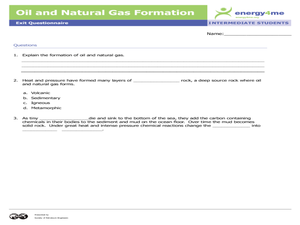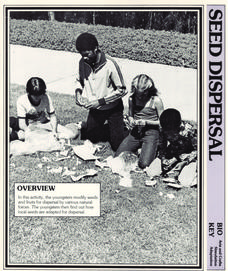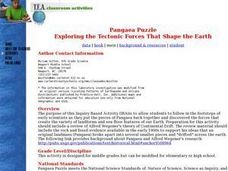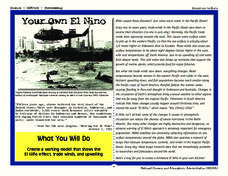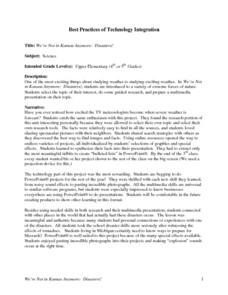Curated OER
Naturally Magnetic Elements
Young scholars explore naturally magnetic elements. In this magnets lesson plan, students examine the periodic table of elements. Young scholars discover the parts of an atom and determine which three elements are magnetic.
Curated OER
Oil and Natural Gas Formation
Students complete a narrative paper and a drawing depicting how the formation of oil and natural gas taken from the Earth's crust were once plants and animals millions of years ago. In this oil and natural gas lesson plan, students read,...
Curated OER
Creeping Sheets of Ice
Young scholars conduct scientific investigation in which they observe glacial
effects on landscape, develop and explain their own theories of how glaciers change land, and demonstrate understanding and explain basic motion and force...
Curated OER
Women's Roles in World War Two
Students explore the various roles of women in the armed forces and their experiences at work. They discuss stereotypes of men and women during World War Two. They read extracts of stories from World War Two in small groups and report...
Curated OER
Humans and the Natural World Poetically
Students read poetry for gist and find images to create a visual narrative. In this poetry activity, students read Green Lane and Flies and Nettles to examine the relationship between humanity and the nature. Students reflect on a...
National Institute of Open Schooling
Solid State
Crystal comes from a Greek word meaning ice. Activity eight in a series of 36 has class members analyzing amorphous and crystalline solids and further classifying them based on their forces. They then explore solids, learning about unit...
Virginia Department of Education
Work and Power
Assist your class with correctly calculating the values for force, work, and power as they determine the amount various activities require. They gather data and participate in a group discussion to compare results upon conclusion of the...
Teach Engineering
Bridging the Gaps
The London Bridge should not have fallen down. And here's why. After a brief history of bridges and the three main types, class members are introduce to the concepts of tension and compression, the two main forces acting upon bridges.
Urbana School District
Magnetism
The compass was first used in 206 B.C., but we didn't discover magnetic poles until 1263 A.D. Presentation begins with the history of magnetism before continuing on to magnetic fields, magnetic forces, electromagnets, currents,...
Barnstable Public Schools
Math Relay Races
A plethora of activities make up a cross curricular choice page filled with math games—relay races, dice, and crossword puzzles—a survey challenge equipped with data organization, graphing, a quicksand recipe, Hula-Hoop activity to...
Curated OER
Seed Dispersal
Students disperse seeds. In this Science lesson, students experiment with various ways to naturally disperse seeds. Students evaluate the effectiveness of the various ways to disperse seeds.
Tennessee Valley Authority
Renewable Energy Sources
Not all energy sources are renewable, as learners investigate in this unit. Made up of six lessons that span a few weeks of instruction, the unit has learners examining US energy reserves and consumption, using data to draw conclusions...
Curated OER
Using Magnetotactic Bacteria to Study Natural Selection
Students observe bacteria that are able to orient themselves using the Earth's magnetic field.They comprehend the difference between anaerobic and aerobic organisms. Students can tell the difference of the shape of magnetic force field...
Curated OER
Pangaea Puzzle: Exploring the Tectonic Forces That Shape the Earth
Sixth graders follow in the footsteps of early scientists as they put the pieces of Pangaea back together and discovered the forces that create the variety of landforms and sea-floor features of our Earth.
Curated OER
Forces of Nature: If I Was A Hurricane
In this comprehension worksheet, students complete a graphic organizer and answer questions. Students pretend they are a hurricane, and use what they have learned to complete the questions.
Curated OER
How to Make a Wind Vane
Students measure the direction of the wind. In this Science lesson, students make their own wind vane. Students discuss the importance of wind direction and speed.
Teach Engineering
Can You Take the Pressure?
Do not let the pressure get to you. The first lesson in a unit of 22 introduces the concept of air pressure. Using background knowledge, the resource gives teachers the information they need to discuss how people measure air pressure and...
Indian Land Tenure Foundation
Native Foods and Livelihoods
Introduce young scholars to the ways in which land and people have a relationship. They examine the types of food local tribes have traditionally consumed and ways in which the people and the land both benefited from the act of...
NOAA
Your Own El Nino
Scholars make a model to discover how the force of trade winds over the Pacific Ocean creates an El Niño. Super scientists observe how the severe weather affects life in water and on land.
Curated OER
We're Not in Kansas Anymore: Disasters!
Students explore weather. They discuss a variety of extreme forces of nature. Students select a topic of their interest and research that topic. They prepare a multimedia presentation on their selected weather topic. Students present...
NASA
Determining the Nature, Size, and Age of the Universe
Prompt scholars to discover the expansion of the universe themselves. Using photographs of other galaxies, they measure and then graph the size and distance of each. Finally, they draw conclusions and prove the universe is expanding.
Curated OER
Helium Balloon Race
Students determine the force of a helium balloon that allows it to rise a specific distance. For this helium lesson students calculate the amount of paper needed to construct a weight and determine the density of a piece of paper.
Curated OER
Look Ma! I'm a Rocket Scientist!
Students use a ball to push and pull to demonstrate the concept of force. In this force lesson plan, students talk about the importance of force in space and use balls to demonstrate this phenomena.
Curated OER
The Science of Hurricanes
Learners are introduced to the science of hurricanes in an effort to highlight how forces change the speed and direction of motion.
Other popular searches
- Internal Forces of Nature
- External Forces of Nature
- Forces of Nature Gravity
- Forces of Nature Research
- Forces of Nature Weather



